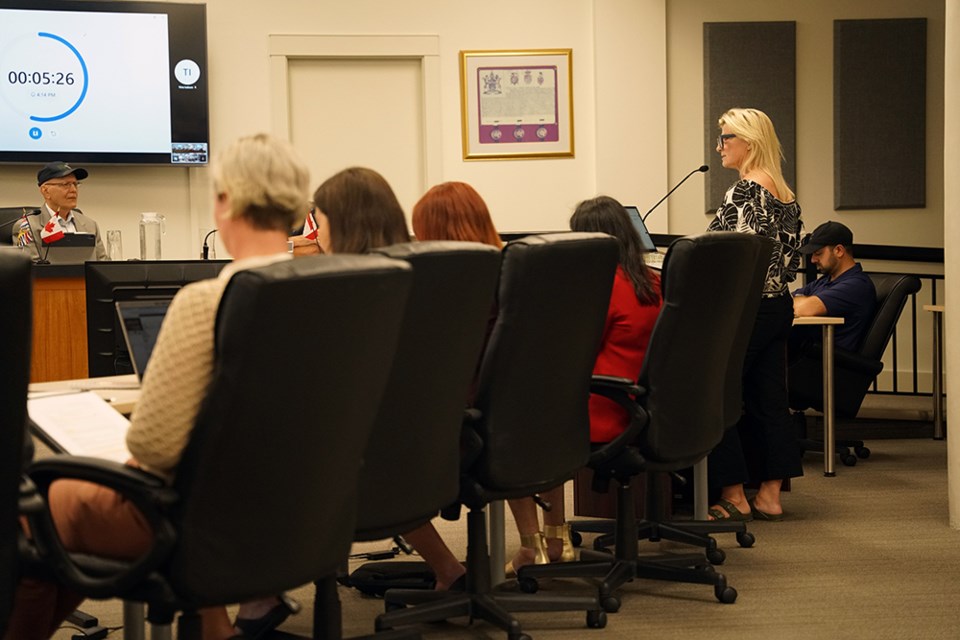City of Powell River councillors were urged to be cautious in amending city council’s procedure bylaw.
At the July 9 committee of the whole meeting, Dr. Kirsten Kramar, who has a PhD in criminology from University of Toronto, spoke to proposed changes to the way city council does business. Kramar said she has published regarding freedom of expression protections and for many years has taught courses on law and policy related to procedural fairness and human rights.
“I’m here to speak about the changes that are proposed for section 21 [of the procedure bylaw] on the public input period, as well as section 28 on delegations,” said Kramar. “In legal terms, these proposed bylaw amendments are an attempt to limit speech through policy or by way of bylaw. So-called disrespectful language, defamatory statements, allegations, inferences, et cetera, although undefined in the policy, are all categories of Charter [of Rights and Freedoms]-protected speech.”
Kramar said a presiding member of the city may not infringe on the protected expression of residents of Powell River by directing them to apologize or stop speaking, or ejecting them from the council chamber. She said an attempt to intimidate residents into silence during a council meeting would be an infringement of section 2B of the charter of rights involving freedom of thought, belief, opinion and expression, including freedom of the press and other media communication.
“Municipal governments have been found to have violated section 2B of the charter when they speak through the use of law or policy to limit the rights of citizens to speak and to be heard in a democratic, decision-making process,” said Kramar. “Any attempt to limit democratic discourse using such vague and subjective categories, including compelling speech in the form of an apology, are in clear and direct violation of a protected charter right.”
Kramar said she’d like to remind councillors that in 2009, City of Powell River was subject to an order by the BC Supreme Court, by way of a ruling. She said in that ruling, the court clearly stated that the municipality may not sue residents of Powell River for defamation and for expressing views in opposition to steps being taken by the city. She said the same principle applies to attempts at suppressing dissent through bylaw amendments.
Kramar said the supreme court ruled that the defendant, the city, lacked any legal basis or right to bring civil proceedings for defamation of its governing reputation, or bring other proceedings of similar purpose or effect, or, to threaten to do so.
“The court went on to say it is antithetical to the notion of freedom of speech and a citizen’s right to criticize his or her government concerning its governing function, that such criticism should be chilled by the threat of a suit,” said Kramar. “In other words, democratic decision making depends upon the free and open debate of public issues and the freedom to criticize the rich, the powerful and those, such as elected officials, who exercise power and authority in our society. Debate on matters of the public interest will often be heated and criticism will often carry a sting, and yet open discussion is the lifeblood of democracy.”
Kramar said she also wanted to address the procedure bylaw’s section 28 on delegations. She said the amendment proposes to apply the city’s respectful workplace policy to the residents of Powell River through extension of an employment policy called respectful workplace and prevention of harassment, bullying and discrimination, in the city’s policy 248. She said unfortunately, it had become more common among political actors seeking to shut down discussion and debate, to use these policies as a cover for censorship.
“Council could be engaging in duplicitous abuse of power by weaponizing a human resources policy to shut down residents who disagree with proposed changes, such as the name change, by threatening to apply punitive measures against residents of the City of Powell River, who express political opinions with which they disagree,” said Kramar. “Experts refer to this abuse of power as lawfare, or, in this case, policy fare.”
Kramar said city residents, when exercising their democratic rights in a public forum designed specifically for political input and debate, should not be impeded by policies.
Join the Peak's email list for the top headlines right in your inbox Monday to Friday.



